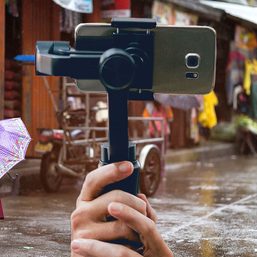SUMMARY
This is AI generated summarization, which may have errors. For context, always refer to the full article.

MANILA, Philippines – Now that the internet is widely accessible to most people, how can we be more responsible on social media? What can people do to promote a safe community on social media?
In the third session of MovePH’s media and information literacy training series, experts highlighted that digital citizens must know and exercise their rights and responsibilities online. This is to help promote a safe and responsible digital environment. The webinar featured World Bank consultant Bernice Soriano and content creator Mona Magno-Veluz (also known on TikTok as Mighty Magulang).
Here are some ways for people to be responsible digital citizens.
1. Know your digital rights
Not all social media users are aware of their digital rights. Soriano emphasized that a citizen’s rights offline should also apply online.
“Digital technology should provide ways to exercise human rights. But what happens usually, these are being violated online…I think a lot of women, LGBTQIA, [and] other marginalized communities would actually echo these. It’s always been said that just because you were bashed online–then it’s okay because it’s just online… No, your rights were still violated and that shouldn’t happen,” Soriano said in a mix of Filipino and English.
Given the lack of or limited laws on digital rights, hatred, anger, and shaming tend to get normalized on social media. This especially applies to how we usually perceive cyberbullying and online violence as passive and harmless.
To learn more about digital rights and how we can help translate these into action in our communities, here are some resources you can check:
- United Nations Secretary Roadmap for Digital Cooperation
- Declaration of European Digital Rights and Principles
- Philippine Declaration on Internet Rights and Principles
2. Be mindful of how you use social media
Responsible digital citizens are savvy social media users. According to Soriano, responsible digital citizens are encouraged to educate and empower people by creating, consuming, and sharing content. This can be done simply by helping a family member protect their social media accounts, or it can be as complex as utilizing social media to spark movements and advocacies to reach more people.
“You have a lot of information available to you. The web, the internet is there. We consume a lot of information, but what’s key is [to] apply the literacy skills to know which information I need, to apply critical thinking, and eventually be able to act as a person that can make good judgment,” Soriano said.
Veluz echoed this, citing how false information is at times created faster than the ability of the platforms to react. Thus, the need for social media users to be careful about what they share and how they interact with posts online.
“If you keep watching accounts that propagate fake news so that you can get angry and leave nasty comments, you are being anger-baited and you are helping drive up their social media relevance. So, the lesson to that is to just stay calm,” Veluz said in a mix of Filipino and English.
People should know what issues to prioritize, and what are the things that should be left ignored. When dealing with conversations online, Veluz suggested practicing a three-strike rule: leave a conversation after three exchanges of debates to avoid further flooding and engaging with internet trolls.
“No matter our purpose for being in social media, we must be upstanding social media citizens…Social media should be a reflection of our values and issues that matter to us,” she added.
3. Engage meaningfully
Disinformation breeds hatred and violence. With heightened conflict on social media, online citizens can easily act like internet trolls without being aware of it, especially when they come across posts that are different from their views.
“We cannot confuse the right to speak with being right. We cannot confuse opinions with facts,” Veluz said.
To sustain a healthy discourse online, citizens should be open to facts and criticism. As opinions should be grounded on facts, people should not be shamed for changing their opinions on certain things, especially when they find better information and evidence on something they once believed in.
Veluz added that it is important for us to be careful in our approach when dealing with disinformation.
“We have to periodically review our tactics to engage people. We have to pivot when the results are telling us that whatever we are doing is not working. We have to continuously innovate on how to share lights, because the darkness will be doing exactly the same thing,” she added.
4. Practice empathy
Empathy can go a long way and is one of the key factors to building trust, persuade, and sustain meaningful relationships with the people around you.
When correcting a relative or friend, Veluz shared that her personal technique is to ask questions politely to understand where they are coming from. By doing that, you are not making it appear as if you are better or smarter than someone else. It is important to acknowledge what they know before you slowly guide them towards the correct information.
On top of that, she also advised the current generation to break the chain of name-calling, bashing, or speaking without sense or reason as it may only hinder people from listening to you.
“I want to believe that people I talk to online and even offline are capable of compassion and kindness, even if we do not always agree…I always tell my kids never write anything down or say anything online if you cannot say those exact words to that person’s face,” Veluz said.
“As a genealogist, I always tell people that 100 years from now, our social media presence will be the primary evidence on what kind of human beings we were,” she added.
The five-part media and information literacy series aims to bring together teachers, students, and leaders who will learn – and talk about – how to be critical and discerning online. This was launched by the #FactsFirstPH initiative, through Rappler’s civic engagement arm MovePH, along with 25 participating schools and organizations in the Philippines.
Participants may register for the media and information literacy series here for free. – Rappler.com
Add a comment
How does this make you feel?

![[Be The Good] Introducing ‘The Listening Project’](https://www.rappler.com/tachyon/2024/05/carousel-4.png?resize=257%2C257&crop=424px%2C0px%2C1080px%2C1080px)

![[WATCH] #TheLeaderIWant: Filipino voters sound off on community issues a year before 2025 elections](https://www.rappler.com/tachyon/2024/05/filipino-voters-sound-off-on-community-issues-1.jpg?resize=257%2C257&crop=276px%2C0px%2C720px%2C720px)

![[OPINYON] Tungkol sa naging viral na social media conjecture](https://www.rappler.com/tachyon/2024/07/thought-leaders-conjecture-07262024.jpg?resize=257%2C257&crop_strategy=attention)
![[DECODED] The Philippines and Brazil have a lot in common. Online toxicity is one.](https://www.rappler.com/tachyon/2024/07/misogyny-tech-carousel-revised-decoded-july-2024.jpg?resize=257%2C257&crop_strategy=attention)



There are no comments yet. Add your comment to start the conversation.